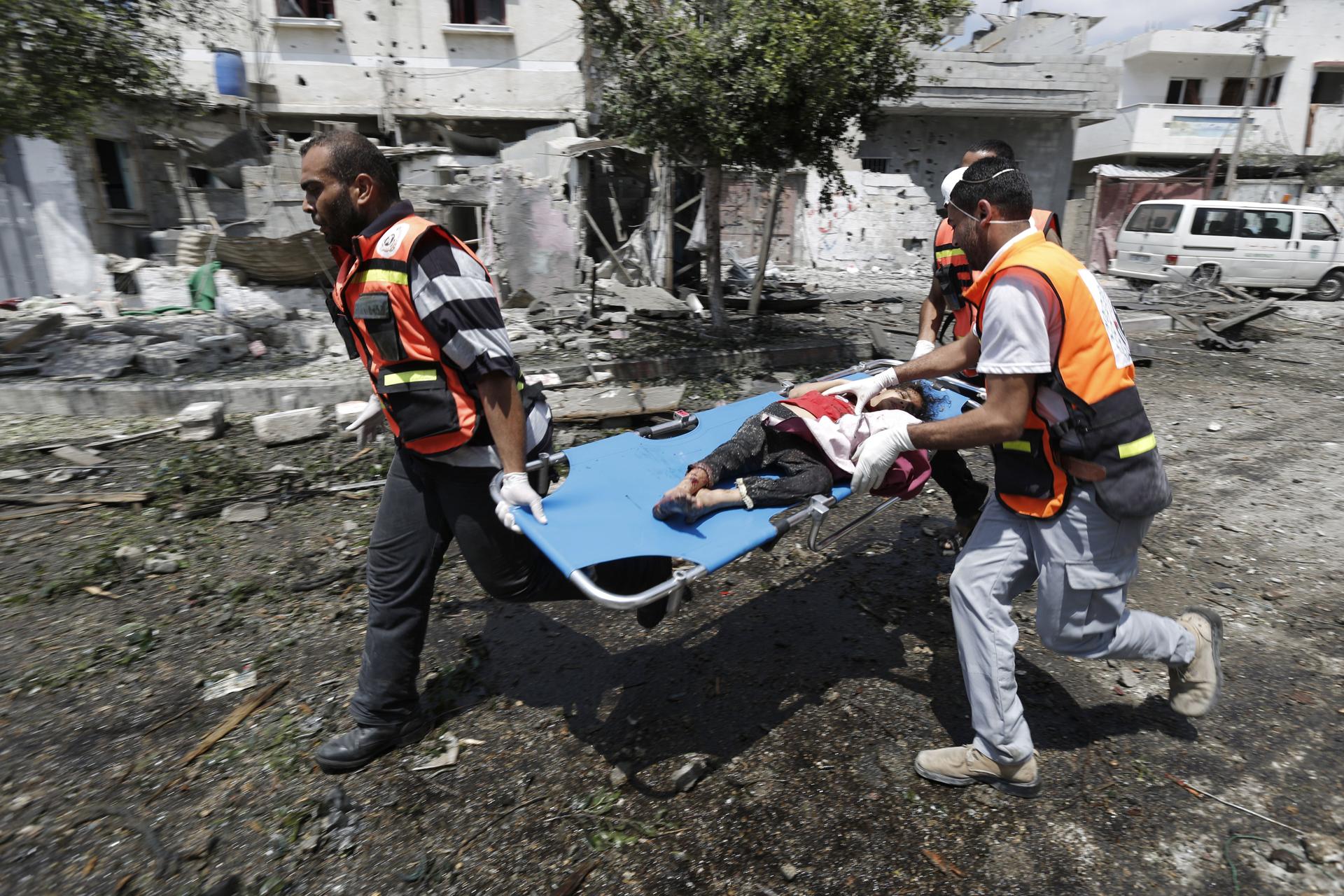Red Cross worker in Gaza: ‘The psychological wounds are many’
Civil Defense workers evacuate the body of a little girl killed during the ongoing Israeli military offensive on the Shejaiya neighborhood between Gaza City and the Israeli border, which has left more than 50 people dead in a blistering bombardment which began overnight, medics said on July 20, 2014.
More than 600 people have died in Gaza since a wave of new violence between Palestinians and Israelis erupted two weeks ago. The United Nations estimates that over three quarters of those dead in Gaza are civilians, with at least a hundred of them children. A hospital that was hit by Israeli shells on Monday, Al-Aqsa Hospital, claimed five more lives, and injured over 70 people.
The fighting in the region during the Islamic holy month of Ramadan has robbed people of basic utilities like water and electricity, and made many others homeless. Aid workers in Gaza told GlobalPost that more than 90,000 people are currently without any water supply, and 18-hour power cuts have become the norm. The bombing intensifies during night, according to one aid worker, terrifying locals who can barely sleep until there is a relative lull after sunrise. And hundreds of people have taken shelter in basements, schools and hospitals.
The International Committee of the Red Cross (ICRC) has been working in Gaza since the recent fighting began, providing medical and infrastructural support to local aid workers. GlobalPost spoke with ICRC’s spokesperson Maria Cecilia Goin, who is in Gaza, to learn more about the organization’s efforts.
GlobalPost: What kind of aid work have you been involved in, in the past couple of weeks?
Maria Cecilia Goin: The intensity of the violence and hostilities has affected the entire population here. For the Red Cross, the priority at the moment is to do immediate evacuation of the sick and wounded so that they can receive medical attention. We are really working hard in the care and treatment of civilians, which is top priority.
We are also trying to coordinate the repairs of vital infrastructure on the streets, including water sanitation and electricity. Thousands of people in Gaza right now have no electricity in their houses. We are helping the local authorities to repair the facilities that were damaged by shelling and fighting.
We have a Red Cross surgeon in the main hospital – Al-Shifa – to help with people who are wounded. People also call us when there are people wounded in the family. We need to arrange with both the Hamas and Israeli government before going with ambulances and taking the injured people to hospital.
Your team went to the Al-Aqsa Hospital yesterday after Israeli shells damaged it. What did you see?
As soon as we got the information about yesterday’s shelling of Al-Aqsa we sent a team of experts. This was to do an evaluation of the situation and the extent of the damage and also to check if the hospital authorities needed the Red Cross. By the time we arrived they had managed to evacuate everybody. We spoke to the medical team there and they are concerned that the area around the hospital is becoming dangerous. This hospital is located in the middle of Gaza and is a reference hospital, which is unique in the region. The patients have to go to the hospital but they are too afraid. The capacity of the medical system is also under a lot of stress.
What kind of difficulties are you facing while doing the relief work in the area?
We work jointly with the Palestinian Red Cross Society in the area in Gaza where fighting is going on. It is difficult to reach people in need while the fighting is taking place. It is easier to go to some of the other places where fighting has subsided. We take ambulances there and transfer the injured to hospitals.
It may seem obvious to you that every person who is sick or injured should be able to rush to the hospital. But that is not happening because of the ongoing fighting.
We have to inform Hamas and the Israeli authority each time we need to go into the area where fighting is taking place. We have to be ready outside where fighting is happening, informing them how many ambulances and aid workers will be going inside. But the coordination is not easy; it takes a lot of time to get approval from both sides.
The staff is working round the clock to help the injured. They are working as much as they can but they are under a lot of pressure. Dozens of the ambulance drivers continue working till night. Last week, two local municipal technicians went to fix a water line and died because of shelling.
The hospitals and medical personnel must be respected under international humanitarian law, as well as civilians who should be protected under the law.
What is the condition of the civilians that you have seen in the past few days?
Hundreds and thousands of the locals are staying in UN schools. Others are living in schools run by the Ministry of Education. While many people have lost their lives, the entire population is in panic. Because Gaza is such a small area, the psychological wounds are many.
This is the third war that the Gaza population is facing in the past six years. The inhabitants are quite strong but there is a lot of frustration because they are not allowed to go out into the streets. Several have lost their relatives, their houses.
Everyone is tense because they don’t know when the hostilities will finish.
This interview has been edited for clarity.
More from GlobalPost: Palestinians seek UN inquiry into Israel assault on Gaza
We want to hear your feedback so we can keep improving our website, theworld.org. Please fill out this quick survey and let us know your thoughts (your answers will be anonymous). Thanks for your time!
